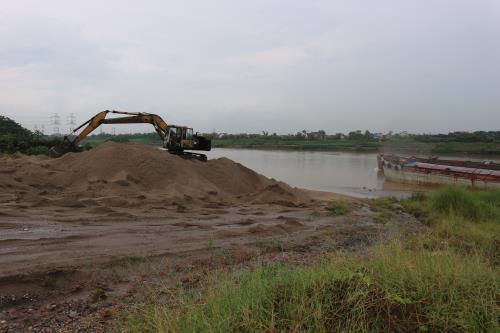 Society
Society

As the capital grows outwards, the district's land price has rocketed in recent years, motivating irresponsible public servants to ignore wrongdoings.

|
| A building materials yard of Phúc Long Company is still open despite local authorities' demand to remove. — VNA/VNS Photo |
HÀ NỘI — Hundreds of long-standing land use violations in Hà Nội’s outlying district of Long Biên have recently been uncovered.
As the capital grows outwards, the district's land price has rocketed in recent years, motivating irresponsible public servants to ignore these wrongdoings.
Before 2014, commune authorities of Bồ Đề, Long Biên, Giang Biên, Ngọc Lâm and Gia Thuỵ allowed households to rent land for farming at about VNĐ500 (US 0.2 cents) per square metre per year for five years.
A broker who specialises in acquiring land use rights told Vietnam News Agency anonymously that there was a common “formula” to change the use purposes of leased farming land.
Lessees would ask local authorities to allow them to surround these areas and set up tents, claiming they needed to protect their plants, cattle, and assets.
After a couple of years when new commune leaders are appointed, these lessees would take advantage of their ignorance to put up buildings on the land or even construct villas for rent.
Thanks to such procedures, investors have collected thousands of square metres of public and agricultural land along the Hồng (Red) River at cheap prices, waiting to switch to other types of land which can bring them profits.
Meanwhile, if these areas come up for public auction, the Government can lease them at better prices.
The Government, in 1993, issued a decree on handing over land for local people to farm.
However, regarding this farming land, in July, 2018, nearly 300 violations on more than 8,300ha of farming land involving illegal construction, improper land use and illegal lease were found in Long Biên District, up 134 cases compared to 2017.
Phúc Long Company, for example, rented farming land from households living on the Đuống River’s bank to set up a building materials yard.
Although local authorities have asked the company to remove all materials from the area, on August 22, the yard was still operating with dozens of large trucks coming in and out to carry sand and rocks.
A barge on the Đuống River was also seen mining and transferring sand to Phúc Long Company’s yard.
“They hired our land then dug soil to sell elsewhere. After that, the company filled the area with rubbish to set up a building material yard. Even if we claim the land back, it is impossible for us to farm,” said a local resident.
The yard’s operation has also caused noise and environmental pollution.
A similar situation can be found in other Long Biên communes like Bồ Đề and Ngọc Thuỵ, where several riverside areas, once maize fields, have been turned into landfills.
According to Nguyễn Quốc Huy, head of Long Biên District Department of Natural Resources and Environment, the complexity of the wrongdoings and the reluctance of communal authorities have created loopholes for illegal acts to continue.
Since 2014, Long Biên District has handled half of detected cases yet only 20 per cent of violated land was revoked.
In Thượng Thanh Commune, for example, there are 47 houses built on agriculture land before 2000.
Communal authorities, however, are unable to come up with any solution as these violations happened long ago without any records, head of Thượng Thanh Commune People’s Committee Hoàng Văn Lực said.
In Cự Khối Commune, 10 similar cases were found by Hà Nội Department of Natural Resources and Environment in 2014.
Explaining the delay in dealing with these problems, communal authorities said they were waiting for further commands from higher-level leaders.
Nguyễn Mạnh Hà, head of Long Biên District People’s Committee, said they had established two task forces consisting of related departments and communal authorities to consider every case and work towards solutions to these wrongdoings, starting with withdrawing land lease contracts.
However, until now, no individual or organisation committing these violations has been charged.
Last year Hà Nội People’s Committee established an interdisciplinary team to inspect illegal constructions on farming land in 10 districts, including Long Biên, Hai Bà Trưng and Cầu Giấy.
Eight heads of communes’ people's committees were suspended for tolerating violations.
Nguyễn Đức Chung, head of Hà Nội People’s Committee, stressed the irresponsibility of authorities was the main cause of the phenomenon and urged active involvement and robust leadership from local administrations in the management of land. — VNS




